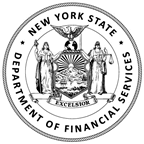NYDFS Announces Invasive New Bitcoin Regulations
 The New York Department of Financial Services (NYDFS) has released a preliminary draft of its upcoming regulations around Bitcoin – and, surprise, surprise, they’re a huge mess.
The New York Department of Financial Services (NYDFS) has released a preliminary draft of its upcoming regulations around Bitcoin – and, surprise, surprise, they’re a huge mess.
The new regulations, which would apply to the New York State region, place a number of restrictions on Bitcoin institutions operating inside New York, or doing business with New York citizens. The most notable restriction is the necessity for NY-based Bitcoin exchanges and Bitcoin-selling services to get a “BitLicense,” which will likely be similar to the licensing process for banks and money transfer services. The NYDFS also bans fractional reserve exchange operation, requires exchanges to be bonded to the NYDFS’s satisfaction, and reserves the right to perform spot security audits of Bitcoin businesses.
This is all relatively reasonable from a regulatory perspective, and restrictions that most observers expected. These restrictions will raise the cost of doing business and raise the barrier to entry for startups, but are not, in themselves, incredibly odious. They may even help to provide an environment in which Gox-style collapses are less likely (presumably the intent of the regulation in the first place). The larger issue, however, is the final rule for Bitcoin institutions: Bitcoin users in NY can no longer be anonymous.
Under the new rules, any Bitcoin merchant, exchange, or payment processor must keep records of the name and location of all of their customers for perusal by the state, and must report to the state if any of the names match the list of people that the Treasury is suspicious of. The businesses are also required to suspend the accounts of users that they feel might be engaging in fraudulent activity, and contact the authorities (exactly the sort of requirement that causes PayPal to shut down accounts in a random, untransparent fashion, producing the frustration that drives many users to Bitcoin in the first place).
This stipulation has a number of ugly consequences. We might start with the question of why the state of New York feels the need to know every time its residents buy or trade money, without even a breath of criminal suspicion. What, exactly, do they suspect the average New Yorker of? To make matters worse, the law actually makes it illegal for New Yorkers to use a Bitcoin tumbling service to anonymize their money after the initial purchase. Furthermore, the law has a host of deleterious, unintended consequences. Online Bitcoin businesses have no reliable way of verifying the identity and location of their users, meaning that Bitcoin businesses in NY must use physical offices with physical ID checks when dealing with private citizens, and cannot conduct web commerce. Take a moment to think about the absurdity of outlawing Bitcoin businesses from using the internet.
It gets worse: The requirement of accountholder verification might extend to businesses operating outside of the state of New York interacting with New York residents. In other words, if a New Yorker wants to use the BitcoinTip bot on Reddit, that would be illegal, not just for the New Yorker, but also for the operators of BitcoinTip, which would drastically increase the barrier to entry for Bitcoin-based web services all over the world, forcing them to identify and block New York-based users from their services if they don’t want to have action taken against them by the State of New York, limiting exactly the sort of innovation that Bitcoin was intended to facilitate.
There are a number of other problems with the law (companies aren’t allowed to keep any profits in the form of cryptocurrency), but nothing that even remotely measures up to the problems created by the account verification requirements.
Financial Services Superintendent Benjamin M. Lawsky, one of the drafters of the new rules, described the regulation on Reddit’s /r/bitcoin like this:
“We have sought to strike an appropriate balance that helps protect consumers and root out illegal activity – without stifling beneficial innovation. Setting up common sense rules of the road is vital to the long-term future of the virtual currency industry, as well as the safety and soundness of customer assets.”
The proposed rules will be officially published on July 23 (six days from today), after which there will be a 45-day grace period, during which the NYDFS will take public comment, and possibly revise the legislation based on those comments. Lawsky gave an initial AMA on Reddit in February about the proposed regulation, which attracted significant attention, much of it surrounding the anti-privacy clauses of the legislation, and much of it very negative.
Lawsky went on to note:
“We recognize that – as the first state to put forward specially tailored rules for virtual currency firms – continued public feedback will be an important part of finalizing this regulatory framework. We look forward to carefully and thoughtfully reviewing public comments on our proposal.”
As matters stand, the proposed law is a nightmare for Bitcoin users all over the world, and for New Yorkers in particular. With any luck, the NYDFS will take some of that feedback into account in its revisions, and weaken or remove the anti-privacy clauses of the proposed law. For those of you with opinions on the proposed rules, you can contact the Superintendent of the NYDFS here.















Growing up is hard to do, and now it is official: Bitcoin, and other cryptocurrencies will soon be stepping onto New York State streets as grown ups, subject to all the rules and regulations as other forms of money. There is shock and anger at having to do all the things grown ups do: and having to get licenses and IDs that other grown ups need..
What? I hear you asking. “Go against Satoshi’s draam?” Maybe.., though I would personally note that we knowingly purchase cars that can go twice the speed limit, and can be easily used for criminal purposes – but most of us grown ups don’t do much more than get parking tickets during a lifetime of driving, and young drivers are subject to special rules and are considered at high risk for accidents.
Just like an automobile, Bitcoins have opened an era of financial freedom that did not exist before, and all governments will be regulating it once their communities start saying that “there ought to be a law”. But, laws are only as restrictive as we make them to be: they are high speed highways that we can spped along on, and with a good map we can go almost anywhere we want to… but we have to follow (and yes, I am pushing this imagery to the limit) as long as we follow the “rules of the road”.
As Co-Chair of CRYPSA, the Cryptocurrency Standards Association, I applaud the New York State proposal and requests for comments. With this state establishing clear rules in which cryptocurrency is clearly seen as a form of money, distinct from fiat currency yet subject to basically the same rules, our industry can move forward in the financial capital of the world.
Our association will be glad to gather the idas and comments of all cryptocurrency enthusiasts, to address the pros and cons of the proposed regulations, and we invite you all to sign up at our website CRYPSA – Arriving Soon , and send us your comments.
http://www.crypsa.org